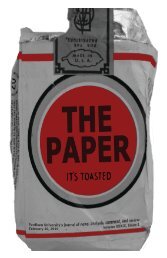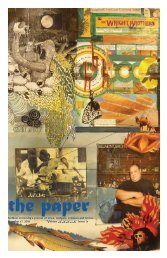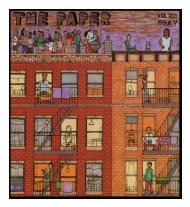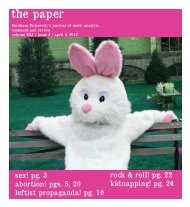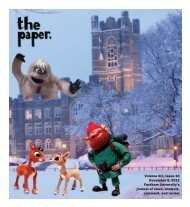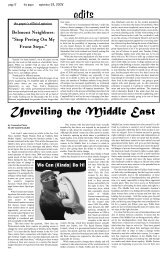Volume XXXVIII, issue x - the paper
Volume XXXVIII, issue x - the paper
Volume XXXVIII, issue x - the paper
You also want an ePaper? Increase the reach of your titles
YUMPU automatically turns print PDFs into web optimized ePapers that Google loves.
page 8 <strong>the</strong> <strong>paper</strong> december 9, 2009<br />
editorials<br />
The Feeling of Truth<br />
by Bobby Cardos<br />
EXECUTIVE EDITOR<br />
have this notion that literature<br />
I has a lot to do with what it is<br />
like to feel something is true.<br />
It tries to transport you, to take<br />
you from saying, “When I die,<br />
I’ll go to hell,” to actually experiencing<br />
<strong>the</strong> terror that, say,<br />
Stephen Dedalus feels when<br />
Fa<strong>the</strong>r Arnall explicates his own<br />
gruesome notion of <strong>the</strong> place<br />
in chapter III of Portrait of <strong>the</strong><br />
Artist as a Young Man. Since I,<br />
like Richard Rodriguez, tend to<br />
think that literature’s primary<br />
subject is “what it feels like to<br />
be alive,” I think that <strong>the</strong>se feelings<br />
of truth predicate some of<br />
<strong>the</strong> more important moments of<br />
our lives—or at least those moments<br />
of hyperawareness that<br />
we may or may not remember<br />
fondly later but will remember<br />
none<strong>the</strong>less.<br />
These feelings are, of<br />
course, also extremely problematic.<br />
I don’t mean this in <strong>the</strong><br />
sense of <strong>the</strong> objective truth that<br />
contrasts one’s own feelings of<br />
truth. Though that <strong>issue</strong> certainly<br />
exists, I can abide it, because<br />
Objective Truth is<br />
more something<br />
we conceptualize<br />
than something we<br />
experience. To exemplify<br />
by way of<br />
literature: take a<br />
novel—say, Absalom,<br />
Absalom!, because<br />
I happen to<br />
like it. Now, <strong>the</strong>re<br />
is, objectively, a<br />
text titled Absalom,<br />
Absalom!, a distinct<br />
and immutable set<br />
of words written by<br />
William Faulkner:<br />
that remains <strong>the</strong><br />
same. However,<br />
what I would posit<br />
is that when I read<br />
<strong>the</strong> novel, and my<br />
roommate or my<br />
professor or William<br />
Faulkner’s editor reads<br />
<strong>the</strong> book, we read a different<br />
book—which is a clever (or not)<br />
way of saying that a work is like<br />
one part of a two piece puzzle,<br />
and while it is a signicantly<br />
larger piece than <strong>the</strong> reader, how<br />
one reader completes <strong>the</strong> puzzle<br />
versus ano<strong>the</strong>r has an important<br />
impact. Put ano<strong>the</strong>r way, what<br />
Absalom, Absalom! causes me<br />
to feel as true will in many instances<br />
be wholly different from<br />
what ano<strong>the</strong>r person feels as true<br />
in reading <strong>the</strong> book. Even more<br />
banally: we’re all different.<br />
This is interesting—at least<br />
to me—but it’s not entirely <strong>the</strong><br />
point (it would be a bit simplistic<br />
if it were). What I want to<br />
focus on here is <strong>the</strong> reader, <strong>the</strong><br />
little piece of <strong>the</strong> puzzle that<br />
completes <strong>the</strong> picture, and how<br />
<strong>the</strong> subject views <strong>the</strong> picture it<br />
has helped complete. To raise<br />
<strong>the</strong> levels of pretension, David<br />
Foster Wallace talks about this<br />
in a graduation speech titled<br />
This is Water, explaining that<br />
most people view <strong>the</strong>ir picture<br />
as a fairly obvious one—maybe<br />
<strong>the</strong> best or even <strong>the</strong> only one. I<br />
certainly am guilty of this. This<br />
is problematic for a few reasons<br />
that most of us can readily see,<br />
but maybe should be restated.<br />
Something obvious to us tend to<br />
be <strong>the</strong> most difcult and frustrating<br />
to explain to o<strong>the</strong>rs to whom<br />
it isn’t obvious. We get annoyed<br />
without thinking that <strong>the</strong> reason<br />
<strong>the</strong>y don’t “get it” is precisely<br />
because <strong>the</strong>y have <strong>the</strong>ir<br />
own “obvious” interpretation,<br />
informed by <strong>the</strong>ir own myriad<br />
of things that comprises <strong>the</strong>ir<br />
existences. Most arguments<br />
about politics and social <strong>issue</strong>s<br />
are fruitless precisely because<br />
<strong>the</strong>y are rooted in <strong>the</strong> “obvious”<br />
perspectives of two people, and<br />
evidence or not, <strong>the</strong>se perspectives<br />
are diametrically opposed.<br />
My Close Reading and Critical<br />
Writing professor freshman<br />
Fact Machine<br />
year told our class before our<br />
rst essay: “There are no right<br />
answers—but <strong>the</strong>re are wrong<br />
answers.” This of course had to<br />
do with proffering textual evidence<br />
etc., but I think this idea<br />
can be easily adapted here. Wallace<br />
gives <strong>the</strong> admission that “a<br />
huge percentage of <strong>the</strong> stuff I<br />
tend to be automatically certain<br />
of is, as it turns out, totally wrong<br />
and deluded.” Again, facts and<br />
objective truth aren’t really <strong>the</strong><br />
<strong>issue</strong> here. Ra<strong>the</strong>r, we communicate<br />
with “wrong answers” or<br />
truths when we fail to realize<br />
that people share our feelings<br />
of rightness towards myriad different<br />
truths, and in order to engage<br />
in dialogue with a person<br />
who is hardwired completely<br />
differently than you requires<br />
you to be aware of this feeling<br />
as well as <strong>the</strong> components of<br />
that feeling which caused it to<br />
be towards that truth instead of<br />
your own. O<strong>the</strong>rwise, dialogues<br />
lack integrity, because <strong>the</strong>y are<br />
not dialogues at all, but ra<strong>the</strong>r<br />
hidden monologues, resulting in<br />
a communicative impasse.<br />
This critical awareness is<br />
not only to <strong>the</strong> benet of compassion<br />
but also forces us to<br />
consider <strong>the</strong> “webs of signication”<br />
that we ourselves are<br />
enmeshed in, and <strong>the</strong> fact that<br />
how we come to our beliefs<br />
and perspectives is largely on<br />
account of things of which we<br />
are unaware or simply cannot<br />
control. Thus, <strong>the</strong> only way to<br />
communicate with integrity is to<br />
try and be aware of just to what<br />
extent we are “free agents,” and<br />
to what degree that idea lacks<br />
integrity, more precisely <strong>the</strong><br />
constructions, both internal and<br />
external, under which we are<br />
able to choose, for we are never<br />
tabula rasa long enough to<br />
make wholly free decisions. By<br />
<strong>the</strong> time we get <strong>the</strong> chance, our<br />
hardwired selves are already at<br />
work, if not driving <strong>the</strong>n at least<br />
leaning us in certain directions.<br />
It’s not that people can’t change,<br />
or that someone who thinks we<br />
should bomb <strong>the</strong> shit out of X-<br />
nation is justied because he or<br />
she was socially constructed towards<br />
that “truth.” It’s just that<br />
you have to know <strong>the</strong>se things<br />
exist if you’re going even going<br />
to pretend to engage in honest<br />
discourse, or be able to understand<br />
and justify your own feelings<br />
of truth. Oftentimes <strong>the</strong><br />
truths we are talking about are<br />
not, in fact, what we are talking<br />
about at all. Better put, “I have<br />
told you <strong>the</strong> truth as I know it.<br />
However, <strong>the</strong> truth as I know it<br />
has very little to do with what<br />
is true.”<br />
<strong>the</strong> <strong>paper</strong>’s view<br />
december 9, 2009<br />
Hey Mr. Ram,<br />
Lay Off My Free Speech<br />
Each week, we at <strong>the</strong> <strong>paper</strong><br />
look forward to settling<br />
down for a chuckle-lled perusal<br />
of The Ram. While <strong>Volume</strong><br />
91 of The Ram didn’t have<br />
as many laughs as last year’s<br />
volume (compliment alert!),<br />
we choked on our proverbial<br />
King Cobra mixed with Red<br />
Bull and Pez (tastes just like<br />
Sparks) when we saw <strong>the</strong> subject<br />
matter recently debated in<br />
The Ram’s reccurring feature<br />
“Point-Counterpoint.”<br />
For those of you unfamiliar<br />
with Fordham’s journal of record,<br />
The Ram runs a feature<br />
in <strong>the</strong>ir Opinions section each<br />
<strong>issue</strong> called “Point-Counterpoint.”<br />
The name is pretty selfexplanatory:<br />
each week two<br />
Ram contributors face off on a<br />
timely <strong>issue</strong>. One contributor<br />
argues for one side of <strong>the</strong> <strong>issue</strong>;<br />
<strong>the</strong> o<strong>the</strong>r contributor argues for<br />
<strong>the</strong> o<strong>the</strong>r side. Sounds awesome,<br />
right? Well… not really.<br />
First, <strong>the</strong>re was a “Point-<br />
Counterpoint” dedicated to<br />
United Student Government’s<br />
Maroon Square proposal<br />
(11/18/09). The proposal looks<br />
to establish a space on campus<br />
that will be set aside for<br />
free speech, including but not<br />
limited to student protest and<br />
dissent. Essentially, USG is<br />
asking for a free speech space<br />
on campus. Maybe it’s just because<br />
we’re <strong>the</strong> “perfect example<br />
of free speech on campus,”<br />
(according to The Ram!), but<br />
this proposal really has us excited.<br />
Finally, we have a USG<br />
promoting progress on our<br />
campus and using reasonable<br />
means to reach an end we all<br />
deserve: free speech. But wait.<br />
This is “Point-Counterpoint.”<br />
A counterpoint to having a free<br />
speech space on campus? In a<br />
college news<strong>paper</strong>? Really?<br />
Really. The mind, it boggles.<br />
In her “Counterpoint” piece<br />
titled “Present Options for Free<br />
Speech Remain Underutilized<br />
and Unappreciated,” Ram<br />
Copy Editor Emily Turek lamented<br />
that <strong>the</strong> vessels for free<br />
speech that we currently have<br />
on campus (she listed The Ram,<br />
<strong>the</strong> <strong>paper</strong>, and <strong>the</strong> community<br />
posting board as examples) are<br />
underappreciated, and <strong>the</strong>refore<br />
we do not deserve a free<br />
speech space. Her cynical and<br />
defeatist piece focused on <strong>the</strong><br />
apa<strong>the</strong>tic tendencies of some<br />
members of our campus ra<strong>the</strong>r<br />
than acknowledging what really<br />
matters: free speech as an<br />
essential part of <strong>the</strong> college experience.<br />
Of all people on this campus,<br />
we, <strong>the</strong> editors of <strong>the</strong> <strong>paper</strong>,<br />
understand that our student<br />
body has its fair share of<br />
apa<strong>the</strong>tic students who would<br />
ra<strong>the</strong>r sing “Don’t Stop Believin’”<br />
in Howl every Tuesday<br />
night than ever raise <strong>the</strong>ir<br />
voice for something <strong>the</strong>y actually<br />
believe in. But we also<br />
have our fair share of students<br />
who seem to really value <strong>the</strong>ir<br />
ability to speak <strong>the</strong>ir minds:<br />
from Progressive Students for<br />
Justice to Respect for Life,<br />
from <strong>the</strong> <strong>paper</strong> to <strong>the</strong> Liberty<br />
Forum, we think that <strong>the</strong>re are<br />
a whole hell of a lot of people<br />
on this campus that would use<br />
a free speech space to passionately<br />
and respectfully champion<br />
<strong>the</strong>ir causes. We don’t<br />
pour countless hours into our<br />
respective clubs and publications<br />
because we want to prove<br />
we deserve such venues for<br />
expression, we do it because<br />
<strong>the</strong>se clubs and causes dene<br />
our college experiences. In <strong>the</strong><br />
end, however, those students<br />
who don’t participate in clubs,<br />
don’t champion causes, and<br />
have never heard of a little leftist<br />
rag called <strong>the</strong> <strong>paper</strong> deserve<br />
<strong>the</strong> right to free speech as much<br />
as any us.<br />
Beyond not deserving free<br />
speech, Turek argues, “Students<br />
should not expect to have<br />
unregulated free speech at all…<br />
We choose to attend a conservative,<br />
private university,<br />
knowing that it is not obliged<br />
to provide us any forums for<br />
free speech.” This is a line of<br />
reasoning that is all-too-familiar<br />
to student activists who<br />
have fought for free speech on<br />
our campus in <strong>the</strong> past. This is<br />
like saying, “Sweatshop labor<br />
is practiced by private companies,<br />
<strong>the</strong>refore we have no right<br />
to demand employees be paid<br />
a living wage.” Fuck, some of<br />
you people arguing against free<br />
speech on campus might actually<br />
think that! Just because we<br />
pay to go to a private school<br />
doesn’t mean we have to sit<br />
and watch as our rights are<br />
violated. They’re called rights<br />
for a reason, and <strong>the</strong>y’re ours<br />
regardless of how we choose to<br />
spend our money. This should<br />
not be up for debate, and <strong>the</strong><br />
fact that it’s being argued<br />
against in a college news<strong>paper</strong><br />
makes us feel almost as deated<br />
as <strong>the</strong> tone in her article.<br />
A week after this piece<br />
was published, The Ram published<br />
<strong>the</strong>ir nal <strong>issue</strong> of <strong>the</strong><br />
semester (12/2/09), featuring<br />
a “Point-Counterpoint” on political<br />
activism at college. My<br />
God, Ram! It’s as if you knew<br />
Continued on page 11


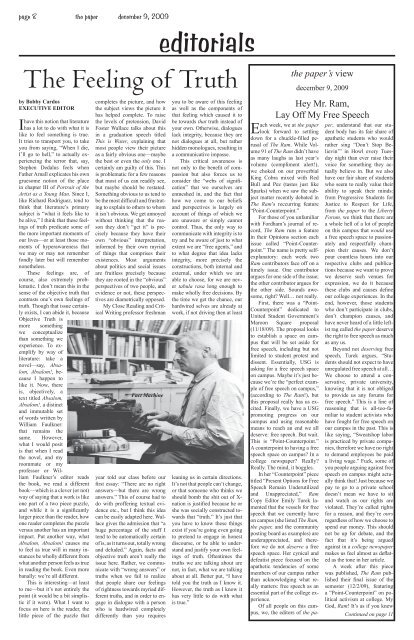
![Read Arts [PDF] - the paper](https://img.yumpu.com/50463455/1/167x260/read-arts-pdf-the-paper.jpg?quality=85)


